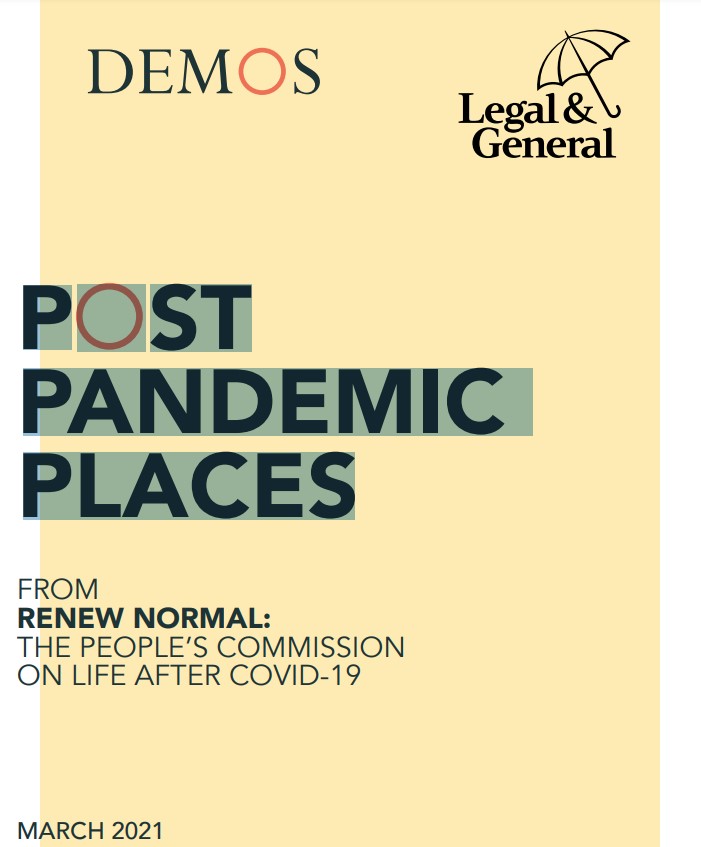Post pandemic places report

|
Contents |
[edit] Introduction
Post Pandemic Places was commissioned by Legal & General and published in March 2021. It reveals that pandemic-based home working, coupled with a desire for continued flexibility, could increase the number of people spending money in their communities and buying local. As a result of these findings, the Government is being encouraged to invest in the establishment of more local offices and hybrid-working initiatives.
[edit] Report findings
Conducted by the think tank Demos, the report found that 65% of the working population were forced to change their place of work during 2020 as a result of the pandemic. Of these, 79% want to continue to have some form of remote working in the future. However, the findings - taken from a large, nationally representative poll of 20,000 adults - indicate that a desire to work remotely is not necessarily the same as wanting to work from home all of the time.
Relatively high levels of support were recorded for ‘local desk space’, particularly among younger people, with one fifth of those in their 20s rating it as their top priority for employment premises in their locality. When asked how people were intending to spend their money once the pandemic restrictions were over, 36% plan to spend more locally than they did before the lockdowns of 2020 and 2021. Amongst those people required to work from home, this percentage rose to 47%.
The report suggests there is an opportunity for the Government and businesses to support more hybrid working and flexible local desk space, to give people the options they prefer and to progress the 'levelling up' agenda. It is also thought the move could help to spread spending power across a wider geographic area.
[edit] Farewell to corporate headquarters?
Historically, investment in landmark regional offices has been shown to drive regeneration and economic growth. This supports job creation, increases in daytime footfall and drives spending towards local high streets.
This has been demonstrated through HMRC’s Government Hubs programme, which has seen the establishment of 11 regional offices across the UK. In Cardiff, for example, the ‘Central Square’ Hub played a role in the city centre’s transformation, supporting an estimated increase in economic wealth of £1.1bn over 10 years.
Based on this model, remote working can help serve as a community regeneration tool. This could be supported by introducing employee tax incentives, such as ‘remote working vouchers’, similar to the childcare voucher scheme.
[edit] Making flex-work permanent
Throughout the pandemic, people changed the location they work, and those people have built a new relationship with their local area that is expected to remain even after pandemic restrictions have been lifted.
The Government has stated that it intends to make all jobs flexible by default. This move could be supported by the conversion of some local civic buildings to remote working spaces, which could be used by any civil servant.
[edit] Related articles on Designing Buildings
- 15 minute city.
- CEOs predict COVID-19 workplace changes will be permanent.
- City centre.
- Commons Committee report on High Street support addresses evidence submitted by IHBC.
- Converting commercial offices to residential accommodation.
- Converting office and retail to residential housing on the high street.
- Creating more socially just and diverse cities.
- Flexible working in engineering services.
- High street.
- Hub and spoke model.
- Meanwhile use of buildings.
- Pandemic migration.
- The compact sustainable city.
- The town's time has come.
- Town planner.
- Workplaces of the future.
[edit] External resources
- Legal & General, Post Pandemic Places.
Featured articles and news
A case study and a warning to would-be developers
Creating four dwellings for people to come home to... after half a century of doing this job, why, oh why, is it so difficult?
Reform of the fire engineering profession
Fire Engineers Advisory Panel: Authoritative Statement, reactions and next steps.
Restoration and renewal of the Palace of Westminster
A complex project of cultural significance from full decant to EMI, opportunities and a potential a way forward.
Apprenticeships and the responsibility we share
Perspectives from the CIOB President as National Apprentice Week comes to a close.
The first line of defence against rain, wind and snow.
Building Safety recap January, 2026
What we missed at the end of last year, and at the start of this...
National Apprenticeship Week 2026, 9-15 Feb
Shining a light on the positive impacts for businesses, their apprentices and the wider economy alike.
Applications and benefits of acoustic flooring
From commercial to retail.
From solid to sprung and ribbed to raised.
Strengthening industry collaboration in Hong Kong
Hong Kong Institute of Construction and The Chartered Institute of Building sign Memorandum of Understanding.
A detailed description from the experts at Cornish Lime.
IHBC planning for growth with corporate plan development
Grow with the Institute by volunteering and CP25 consultation.
Connecting ambition and action for designers and specifiers.
Electrical skills gap deepens as apprenticeship starts fall despite surging demand says ECA.
Built environment bodies deepen joint action on EDI
B.E.Inclusive initiative agree next phase of joint equity, diversity and inclusion (EDI) action plan.
Recognising culture as key to sustainable economic growth
Creative UK Provocation paper: Culture as Growth Infrastructure.
Futurebuild and UK Construction Week London Unite
Creating the UK’s Built Environment Super Event and over 25 other key partnerships.
Welsh and Scottish 2026 elections
Manifestos for the built environment for upcoming same May day elections.
Advancing BIM education with a competency framework
“We don’t need people who can just draw in 3D. We need people who can think in data.”
























